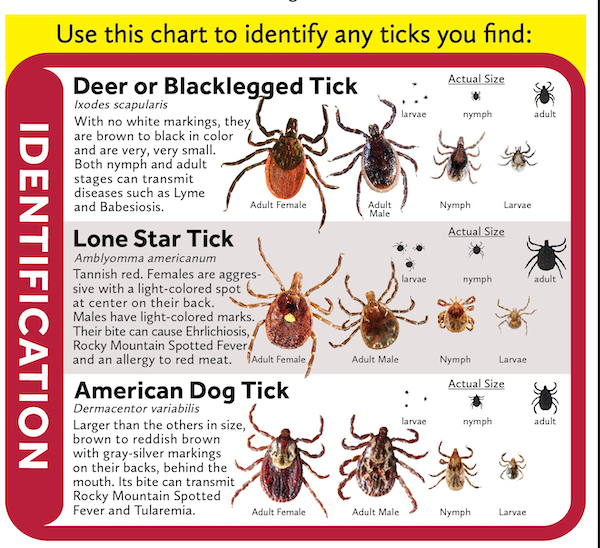
Tick-borne diseases. Chances are that you, or someone you know, has been diagnosed with Lyme Disease or some other illness carried by ticks.
Learn what you need to know when Rebecca Young, RN, BSN, gives a talk at the Shelter Island Public Library. She’s a member of the Medical Advisory Panel of Stony Brook Southampton Hospital’s Regional Tick-Borne Disease Resource Center.
Among her responsibilities: management of the help line, 631-726-TICK. Young speaks at the library on Monday, May 6, 5:30 p.m. Register at the Circulation Desk, or call 631-749-0042.
Tick-borne diseases
Stony Brook instituted the resource center six years ago. It’s goal: to educate the public, promote collaboration in the medical community and facilitate access to diagnosis and treatment of tick-borne diseases.
“The East End’s danger season for tick-related diseases is April to October, although ticks can bite at any time during the year,” Stony Brook says in a brochure about ticks.
Diseases ticks can transmit include:
- Lyme Disease
- Babesiosis
- Ehrlichiosis
- Rocky Mountain Spotted Fever
- Anaplasmosis
How to stay safe
Stony Brook recommends:
- when outdoors, pull socks over pant legs and tuck in shirts
- check for ticks daily
- mow yard frequently
- keep brush and leaves raked
And especially be on the lookout for deer or black-legged ticks, Lone Star ticks, and American dog ticks.

How to remove a tick
Stony Brook recommends using a magnifier and tweezers:
- place tweezers close to skin and grab tick by its head
- pull upward slowly and steadily
- don’t be alarmed if the head remains in skin; disease transmission is not possible without the entire body
- disinfect the bite area with rubbing alcohol or soap and water
- save it in a baggie or pill vial labelled with removal date
- see your doctor if you develop a rash, fever, aches, fatigue or swollen joints
Free tick removal kit
At the library presentation, Young will hand out free tick removal kits to attendees. The kit contains all you need to be prepared for tick bites — pointy tweezers, magnifier, first-aid supplies, and Tick ID Card.
If you’re unable to attend the May 6 tick talk, you can request a kit by contacting karen.wulffraat@stonybrookmedicine.edu or calling 631-726-TICK.




